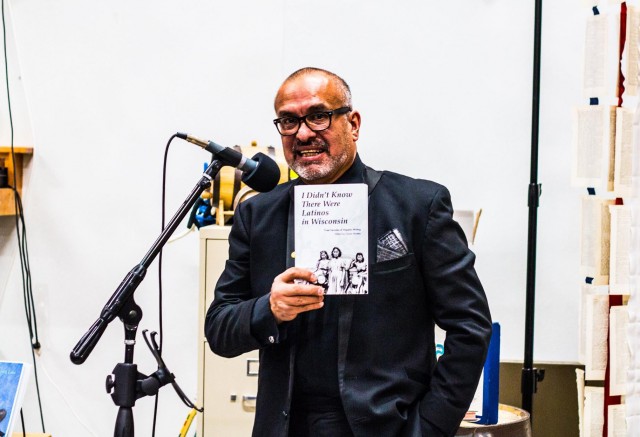
 For as long as Oscar Mireles can remember, he has had to fight for his voice to be heard.
For as long as Oscar Mireles can remember, he has had to fight for his voice to be heard.
He had to fight for his voice to be heard as a kid in a big family and as a Latino in Madison community. But he mentions that being in a big family helped him become a good writer.
“I had to fight for my voice, so I kind of learned how to be a better listener,” he says. “And I think to be a writer and a poet you have to learn how to listen.”
Fighting for this voice to be heard as a kid is one of the things that led to him fighting for Latino voice sto be heard in the Madison community which is one of the reasons behind him working as a first Latino Poet Laureate of Madison and editing a poetry anthology called “I Didn’t Know There Were Latinos In Wisconsin.”
As Poet Laureate, Mireles is continuing the Metro bus lines poetry project which was started by Fabu Phillis Carter (the third Poet Laureate, and first African American to hold the position). This project involves people in the community sending Oscar Mireles poems and him selecting the poems to post inside Madison Metro buses.
When asked what do you look for in the poems, Oscar Mireles answers, “I look for a kind of originality. I look for a new voice. I look for how impactful are these words alone.” He also works with the public libraries on a number of activities for Poetry Month every April.
To help us understand more about his anthology, Mireles talks about how there is a diversity among Latinos, too, and he wanted to express that to the world. This anthology contains diversity in the voices and the writing style as well.
“I like to think poetry is anything that’s written,” he says, which is why, if you open his anthology, you’ll see see an essay on one page and memoir on the other page. He also mentions that he wants to reveal Latino diversity in this book by bringing people together and encouraging them to express their experiences.
Another big part in Mireles’ life involves directing Omega School. Omega is a school that helps people get their GED by giving students individual support and eliminating obstacles that students from getting their GED.
From the beginning, Mireles had some community organizing and fundraising skills. For example, he had already organized 20 different Latino festivals. He used those skills to help Omega school be financially stable.
When Oscar started working at Omega school, all he knew about GED “was that my brother and sister both got their GEDs. And that they were able to use that to move on with the rest of their life. My sister (later) got her master’s degree in education.” There are two reasons from Oscar Mireles to explain how crucial is GED “opens up a lot of doors” and “You can’t start college without a high school diploma.” Omega School is always looking for volunteers; simply reach out to Oscar Mireles through the Omega school website.


































